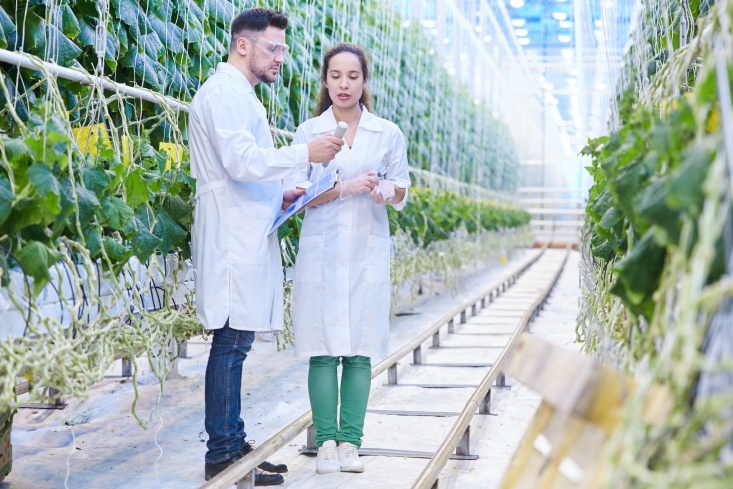Food security is one of the most pressing issues facing the globe as our populations grow and the climate changes in unpredictable ways.
Working in the agritech industry means you’ll work alongside cutting-edge technologies to develop solutions that enhance food quality, yield and sustainability to deliver a healthier and more stable society.
Considering the small size of Singapore, innovative solutions are required to create enough fresh produce. Below, we explore the most interesting agritech roles and their salaries so you can find the ideal job.
Looking to join the agritech industry? Explore available job listings now on MyCareersFuture!
What is the agritech industry?
The agritech industry goes back to the origins of farming itself, as people have continually developed clever solutions to overcome the climate and grow life-sustaining food.
However, modern agritech – a portmanteau of agriculture and technology – combines ingenious inventions like robotics, drones, machine learning and driverless vehicles to enable superior farming outcomes.
As Singapore produces just 10% of its food supply locally, the government has recently embarked on an ambitious plan to revolutionise the country’s farming output.
In fact, the ’30 by 30′ campaign aims to see Singapore produce 30% of its food by 2030. By finding your place in the agritech industry, you can play an increasingly important role in our collective future.
Why you should work in the agritech sector
It’s no secret that Singapore lacks the space to grow vast swathes of fresh produce, with just 1% of land set aside for agriculture. So, how can our country achieve its food supply goals?
Through innovative urban solutions like vertical farming, high-tech aquaponics and data-driven resource management, these technologies and many others will take everyday farming practices to the next level.
If you’re looking to work on projects that have the potential to change the world, there are few better industries to explore than agritech.
Supported by large-scale government funding – like the $60 million Agri-Food Cluster Transformation Fund – advanced start-ups and multinational operations are hiring the next generation of talent.
Looking for a new role? Explore over 100,000 jobs available on MyCareersFuture now!
What qualifications do you need to work in the agritech industry?
The agritech sector offers several career paths that enable people from either agricultural or technological backgrounds to find their ideal job. Meanwhile, there’s always a need for product leads, sales staff, business development and customer success professionals to help businesses grow and reach peak performance.
IT roles are also important in this sector as there’s a need for technical expertise to propel engineering and data-driven decision-making. Software engineers, IT managers and data analysts can explore beyond the tech industry with a fulfilling position in agritech.
Although a bachelor’s degree in a relevant field is required for many positions, some entry-level roles may teach all the skills needed through on-the-job training. Consider qualifications in the following areas to give yourself a head start:
- Agriculture
- Biotechnology
- Computer Science
- Data Analytics
- Engineering
- Environmental & Marine Science
- Science
Agritech sector salary estimation
The various jobs available in Singapore’s burgeoning agritech industry mean salaries depend heavily on your skills and experience, alongside the company’s organisational structure.
Yet as the local industry continues to grow, more international companies and well-funded Singaporean operations will provide fresh graduates and mid-career switches with plenty of financial incentives.
Below is a list of the estimated agritech sector salaries for the industry’s most in-demand roles, beginning with starting pay.
Please take note that these figures are not officially approved by Workforce Singapore. These are deductions after pooling together data from various sources. These include:
- Indeed Salary Guide
- Glassdoor Salary Guide
- Jobstreet Salary Guide
- Talent Salary Guide
- PayScale
- Seedly
These only serve as a helpful benchmark of salaries in the agritech industry and are not indicative of actual salaries.
| Agritech Industry Salary Guide in Singapore | ||
|---|---|---|
| Role | Minimum Education Qualification | Salary |
| Urban Farmer | ‘O’ Level | $2,000 – $3,000 |
| Operations Manager | Degree | $3,500 – $8,000 |
| Agronomist | Degree | $2,750 – $6,000 |
| Software Engineer | Degree | $4,250 – $8,000 |
| Data Analyst | Degree | $3,500 – $7,500 |
| Business Development Officer | Degree | $2,750 – $6,500 |
| IT Manager | Degree | $5,250 – $8,000 |
Discover your place in the Singapore agritech industry
Following widespread supply chain disruption caused by the pandemic, the need for robust food production has taken on a new level of significance. As such, the government has launched a new career conversion programme (CCP) to create 4,700 more agritech jobs by 2030.
Those hired under the CCP will be employed for at least one year and receive a minimum monthly salary of $2,500 for agritech specialists or $2,000 for agritech operators. With 15 companies already hiring new team members under this scheme, it’s the perfect place to start for graduates and mid-career switches.
To read more about Singapore’s most exciting sectors and how to maximise your salary, visit MyCareerFuture’s 2023 Salary Guide. You’ll learn how to measure your salary against similar workers while getting expert advice on increasing your earning potential.

















